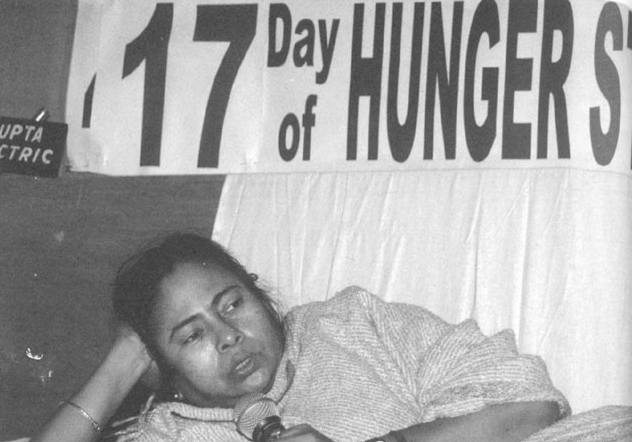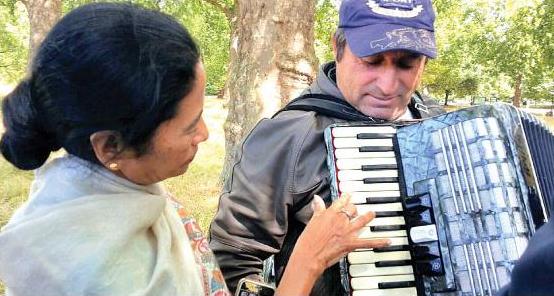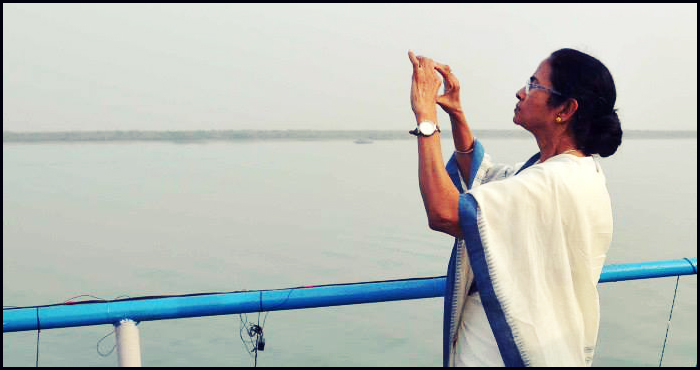Mamata Banerjee – she is the Chairperson of Trinamool Congress, the Chief Minister of West Bengal. She has been featured in TIME magazine’s list of 100 most influential people in the world. She is an epicentre of energy.
She is fondly called Didi by the people. Apart from her political self, there also is another Mamata Banerjee – one who loves to paint, write or play music on a tablet.
Here are some excerpts from an interview with Mamata Banerjee. Come discover the other side of Mamata…
Q: At the very outset, Didi wish you Shubho Noboborsho
MB: Subho Noboborsho to you too. I want to extend my greetings to Maa, Mati, Manush of Bengal. Noboborsho signifies the beginning of a new chapter. In the words of Tagore, “Esho esho, amar ghore esho”. I hope everyone stays healthy and safe.
Q: Is it true that you started your career as a teacher?
MB: I used to teach a few poor kids in my locality to run my family. My father had passed away when I was young. I had to pay for my education also. I loved teaching poor students who could not afford to go to schools. I have taught many students without taking any money.

Mamata Banerjee with school students
Q: Your life is one of struggle
MB: When my father was alive, there was no struggle. We managed well. My father was a very kind-hearted man. Whenever he got chocolates for us, he distributed the same to all kids in the locality. We have imbibed this habit from him.
I have spent all my life in Kalighat. I have grown up here. When Muktijuddho was going on, we were in school. My father used to listen to the news on the radio and tell us stories of Mukti Bahini and India’s freedom struggle. He used to tell us stories of Tagore, Nazrul, Masterda, Swami ji, Netaji.
This instilled the spirit of patriotism in me. After my father passed away, I decided to join Chhatra Parishad. We also saw the ugly side of politics in college. There was a lot of violence, we saw many people being led astray in Naxal movement.

Mamata Banerjee on hunger strike
Q: You have a special attraction towards Birbhum, your mamabari
MB: It is not true. Entire Bengal, specially rural Bengal, enjoys a special place in my heart. I love all the districts. I have hardly stepped out of Bengal or India. I love Bengal.
It is true that we used to spend our vacations in our mamabari. There we learnt the custom of Nabanna (spring harvest). Inspired by that I have named the Secretariat as Nabanna. Rural life was very simple.
Q: Your first political success came in 1984
MB: Chhatra Parishad unit in our college was always very proactive. We went through a lot of struggle. We were always ready for a political fight. Our struggle created an example for entire Bengal. We had dedication. We raised our own funds to run the organisation.
The plenary session of Congress was held in 1983. By that time I had taken active part in several movements against Left Front. Also, our family was always politically very aware. In the panchayat elections, I campaigned across Bengal with Subrata Da (Subrata Mukherjee).
I am a committed worker. When no one else was ready to fight against Somnath Chatterjee, and the party gave me the duty, I said yes.

Mamata Banerjee elected to Parliament
Q: Your experience in Parliament at such an early age
MB: We came from a humble background. We had Bengali-medium education. My fear was how to speak in English. I spent a lot of time in the House and gained a lot of knowledge.
I remember a particular incident. People of Jadavpur had asked me to raise the issue of land for refugees. Half an hour discussion was going on in the Parliament. I demanded to raise the issue of giving land plots to refugees unconditionally. The Speaker asked me to submit a separate notice, which I did. That was the beginning of my stint in Parliament.
Q: The formation of Trinamool Congress in 1997
MB: I do not believe in bowing down. In 1997 when I noticed that my party leadership was just wasting time and was not eager to listen to our grievances, we decided enough is enough. We were determined to form a new party. Congress tried to prevent me from founding a new party. Even before Congress expelled me on 22 December, 1997, we submitted documents to the Election Commission.

Mamata Banerjee with senior citizens during Durga Puja
Q: Emergence of the name Trinamool Congress
MB: In 1997, when the Congress convention was going on at Netaji Indoor Stadium, we organised an outdoor convention. We believed in working for grassroots people. We wanted to work for common people. That is why we chose the name Trinamool. Even the symbol represents ghasphool. The symbol was sketched by Ajit Da (Ajit Panja) and me.
Q: You spend Poila Boishakh and Durga Puja at home every year
MB: I cannot stay anywhere else. I will always spend Poila Boishakh at home every year. Even Durga Pujo… I do not keep any engagement on such occasions. We even have Kali puja at home every year.

Mamata Banerjee offering prayers at Dakshineshwar
Q: Tell us about the Hazra attack in 1990
MB: That was just a beginning. I have been through many attacks. I am committed to politics. There was an attack on us when were protesting against adulterated oil in Behala.
The government used to snoop on us. They had kept people to follow me wherever I went. They were plotting to kill us. Even Rajiv ji was aware of this and wanted me to take police protection.
There was a bandh on 16 August, 1990. My mother was apprehensive and did not want me to step out of home. I tiptoed out of the house without informing her. We took out a rally from Hazra when we were attacked by a gang of goons. I got blows on my head and started bleeding. I covered my head with my hand and saved myself.
Q: 21 July is a significant date in your political career
MB: On 21 July 1993, we had a rally to Writers’ Buildings. Thousands of people were marching with us. Police fired shots at us to disperse the crowds. I was beaten black and blue. Some CPM cadre may also have been there is uniform. They tried to kill me that day.
I can never forget the Garden Reach incident also. We went to meet a family which was the victim of CPM’s terror. They surrounded our car and pelted stones at us. They climbed the bonnet of the car and tried to assault us. Suddenly we heard gunshots. Somehow we managed to escape.

The Hazra attack, 1990
We had to undergo a lot of struggle. Some people who have got everything on a silver platter do not value the struggle we have undergone. These are challenging years. Some media houses have taken up propaganda and slander. It is sad. We never cross our limits. These days they call us thieves and dacoits.
My life is one of struggle. I do not want to stop. Life means moving on. The more they attack us, the stronger our resolve will be. We have given the slogan “Bodla noy, bodol chai”. Despite the horror of 34 years of CPM rule, we did not harm their party workers. But today, people who cannot even win councillor elections are tearing our flags and playing the victim. This makes me sad as well as angry.
Q: Any regrets in life?
MB: Whatever I have achieved in life is because of the blessings of people. Since we had a humble upbringing, we have learned to be simple, we learned to respect everyone. During our childhood, we did not have any scope of education in English. But children are lucky now. I tell people there is no need to be afraid of grammar. No one speaks perfect and grammatically correct English.
Q: You have named your bag Jangalmahal
MB: (Laughs) I love Jangalmahal. It is my pride. In the bag I carry everything that I need in my daily life. I even carry medicines; once they came in handy when I cured a reputed doctor of pain in his waist (smiles).

Mamata Banerjee with her bag
Q: You can also cook well
MB: When I was in Delhi, I used to cook regularly. Not anymore. Whenever I get time, I try to cook. It is an art. I love to do housework also.
Q: Pressure tactics by other parties don’t work on you
MB: I cannot be intimidated. No one can use pressure tactics to make me do something. If you show me CBI, ED etc. I will show you the power of people. Democracy is of the people, for the people, by the people. They are my strength. I bow my head to them.
Q: At any public event, you never sit still at one place
MB: I believe in direct eye-to-eye interaction with the public. I can never read out from any paper. This is my habit. If I am standing on the left, the people on the right cannot see me, and vice versa. So I like to go around the stage. I believe in being spontaneous.

Mamata Banerjee with kids in north Bengal
Q: You have lost weight. You hardly eat and survive only on tea. You also walk a lot…
MB: (Smiles) I walk on the treadmill for 8 KM in the morning. I love to walk. It has become my habit. I love to eat muri and fish at night. I do not eat junk food.
Q: Your idols in life:
MB: It is a huge list that includes Rabindranath, Nazrul, Netaji, Masterda, Swami ji, Ramakrishna, other dharma gurus… Who do I name and who do I leave out?
Q: You also love music…
MB: Yes, I love music. I listen to music whenever I am travelling. It is my life. It is an inspiration. It rejuvenates my mind. I listen to all genres of music. My father had a lot of LP records; I imbibed my love for music from him.
Sometimes I play music on the tablet when I have time. I also check Twitter, Facebook whenever I get time. I do not watch any news channels. I derive information on what is happening around the world from these social media channels.

Mamata Banerjee capturing a slice of nature
Q: You are a great writer. Please read a few lines of your poem for us
MB: Here are a few lines from my favourite poem Mati:
Mati amar moner fosol
Mati amar bhor
Mati moder matribhumi
Mati moder jor.
E mati moder Lokkhir panchali
E mati Saraswati
E mati sobar, tomar-amar
E mati bhobisyoter goti.













